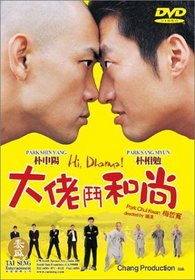| Actors: Shin-yang Park, Jin-yeong Jeong, Sang-Myeon Park, Seong-jin Kang, Su-ro Kim Director: Cheol-kwan Park Creator: Gyu-tae Park Genres: Indie & Art House, Comedy, Drama Sub-Genres: Indie & Art House, Comedy, Drama Studio: Tai Seng Format: DVD - Color,Widescreen - Dubbed,Subtitled DVD Release Date: 01/14/2003 Original Release Date: 01/01/2002 Theatrical Release Date: 00/00/2002 Release Year: 2003 Run Time: 1hr 35min Screens: Color,Widescreen Number of Discs: 1 SwapaDVD Credits: 1 Total Copies: 0 Members Wishing: 1 MPAA Rating: Unrated Languages: Cantonese, Korean, English |
Search - Hi Dharma! on DVD
  | Hi Dharma Actors: Shin-yang Park, Jin-yeong Jeong, Sang-Myeon Park, Seong-jin Kang, Su-ro Kim Director: Cheol-kwan Park Genres: Indie & Art House, Comedy, Drama UR 2003 1hr 35min Studio: Tai Seng Entertainment Release Date: 08/23/2005 Run time: 97 minutes |
Larger Image |
Movie DetailsSimilar Movies
|
Movie ReviewsHi Dharma! Hansol Lee | 10/09/2003 (3 out of 5 stars) "Overly slapstick and juvenile at times, but still an entertaining fluff. Most of the laughs come from the clever dialogues and off-beat situations, however. The exaggerated physical comedy falls flat more often than not." The other reviewers are wrong ;-) Karl S. Chwe | Denver, CO United States | 08/21/2008 (4 out of 5 stars) "First, a bit of context. South Korea is one of the most highly urbanized countries in the world. About half of the country lives in a single metro area surrounding Seoul, and a quarter (20 million people) lives in Seoul itself. Seoul is the second most expensive city in Asia and the fifth most expensive in the world. It is full of skyscrapers. It is crowded and busy, and the traffic is ridiculous. It makes New York City look like Mayberry, North Carolina.
South Korea has become industrialized extremely rapidly. It moved from rice paddies to plasma tv's in just a few decades. And there have been vast social and economic changes too. So most people who live there actually remember, for instance, living in villages with no or little street crime. This movie starts with an urban gangster dispute that ends with several gangsters on the run from the police (probably accurately, the movie shows them using knives and clubs rather than guns.) The gangsters flee to the countryside, and stumble on a Buddhist monastery. They treat the monastery as their private domain, attempting to intimidate the monks into giving them shelter. Mind you, these are perhaps not the most frightening men in the world, but they are criminals on the run. Yet as they have for millennia, the monks accept the gangsters and give them food and lodging. A clash of the two cultures, one used to confrontation and domination, and the other to contemplation and mildness, occurs. And gradually, with much scowling and pacing, the gangsters begin to give in. But not without struggle on both sides. A few monks are terrified. One monk, the only one who might be called a man of action, wants deeply to teach the disrespectful thugs a lesson. But the monastery's master guides them all with a sure, patient hand. One gangster discovers a monk who has taken a vow of silence, and is totally nonplussed. He talks at the monk nonstop, trying to understand how this can be. His words bounce off the silent monk like fried dumplings. And the hyperactive, hyper-emotional gangsters begin to feel a bit of peace in their hearts. And at the end of the movie, each gangster receives his own personal bit of grace, even the angry one, who decides to stay behind. There is some humor and a bit of pathos, and when the outside world, in the form of rival gang members seeking revenge, threatens the monastery, there is a bit of genuine danger. You feel how fragile the monastery and the monk's way of life is. And the master departs probably in just the right way and in just the right moment, namely when he is needed most. So to return to the context. For a Korean, the monastery is a throwback to a nostalgic and possibly romanticized past. It is a bit of a long-gone world but one many Koreans can actually remember. That gives the movie an extra bit of poignancy that Westerners might miss. As an aside, some have said that out of Asia, the Korean sense of humor is probably closest to the Western. Perhaps this movie illustrates how that might be." |



